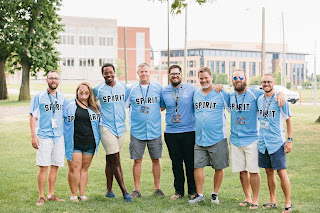Practice makes...
"Practice does not make perfect. Only perfect practice makes perfect."
I prefer the much shorter version of this quote, "Practice makes permanent." I first heard this shorter version of this phrase when I was a young teacher, when a much more experienced teacher came to work with my students, Mr. Ed Knob. Daniel Coyle, in his book, The Talent Code, discusses how the brain forms habits through the actual wrapping of synapses with a protein called, Myelin. The research suggests, that the act of repeated tasks creates this Myelin wrap that helps to speed up/automate certain tasks. This is what allows us to read more rapidly, solve math problems, write, balance a check book, throw a baseball etc...This protein is created with no regard to the correct way or the wrong way of doing a task; the process occurs as a result of repeated tasks.
 Aristotle said the same phrase, slightly more eloquently,
Aristotle said the same phrase, slightly more eloquently,
 Aristotle said the same phrase, slightly more eloquently,
Aristotle said the same phrase, slightly more eloquently,
"We are what we repeatedly do. Excellence, then, is not an act, but a habit."
In the field of music--I would venture to say, more than any other subject, we constantly chase perfection in our performances. If other subjects were like music, a teacher would say, "The lowest grade on our Science test was a 90%, which means everyone earned an A. Despite several of you earning a 100%, everyone will earn a 90%." Another version, "A 98% on this test means that there were still too many missed questions. We will all take the test again, until we all receive a 100 %." If this was to happen in an academic class, there would be an unparalleled uprising among the students and the parents.
Yet, this is a daily concurrence in a quality music class. For example: Everyone plays a passage in the music with expression, excellent tone quality and attention to musical details and, yet, one student, who is unprepared, fails at all, or even just one, of these tasks. The result: the audience hears a passage filled with wrong notes, uncharacteristic tone and this all limits the degree of expression that the group can achieve. I was recently working another band and we did a brief demonstration for the parents at the final event of the clinic. I had 25 clarinets play a C and I had one clarinet play B. Just one! The demonstration was powerful; all you could hear was the one wrong note.
If students study music, their experiences in a quality music class provide them with an awareness of: a responsibility to a collective whole, mastery in all we attempt, the elation of an aesthetic experience, persistence to a task, and the true joy of quality repetition that leads to Myelination. As educational circles are increasingly pushing toward STEM--Science/Technology/Engineering/Mathematics--it seems to me that all of these skills and concepts would clearly help our future engineers, scientists, doctors and a host of other fields. Happy practicing! Practice makes...
If students study music, their experiences in a quality music class provide them with an awareness of: a responsibility to a collective whole, mastery in all we attempt, the elation of an aesthetic experience, persistence to a task, and the true joy of quality repetition that leads to Myelination. As educational circles are increasingly pushing toward STEM--Science/Technology/Engineering/Mathematics--it seems to me that all of these skills and concepts would clearly help our future engineers, scientists, doctors and a host of other fields. Happy practicing! Practice makes...



Comments
Post a Comment